Hôtel particulier
An hôtel particulier (French pronunciation: [otɛl paʁtikylje] ⓘ)[1] is a grand townhouse, comparable to the British townhouse or mansion. Whereas an ordinary maison (house) was built as part of a row, sharing party walls with the houses on either side and directly fronting on a street, an hôtel particulier was often free-standing and, by the 18th century, would always be located entre cour et jardin – between the cour d'honneur (an entrance court) and the garden behind.[2] There are hôtels particuliers in many large cities in France.

Etymology and meaning
The word hôtel represents the Old French "hostel" from the Latin hospitālis "pertaining to guests", from hospes, a stranger, thus a guest.[3] The adjective particulier means "personal" or "private".
The English word hotel developed a more specific meaning as a commercial building accommodating travellers; modern French also uses hôtel in this sense. For example, the Hôtel de Crillon on the Place de la Concorde was built as an hôtel particulier and is today a public hotel.
In French, an hôtel de ville or mairie is a town hall and not a hotel. Other official bodies might give their name to the structure in which they maintained a seat: besides Paris, several other French cities have an Hôtel de Cluny, maintained by the abbey of Cluny. The Hôtel de Sens was built as the Paris residence of the archbishop of Sens. The Hôtel de Bourgogne in Paris was a theatre, taking its name from the former Paris residence of the Dukes of Burgundy on the site. The Hôtel de la Marine, now a museum, took its name when it was the naval ministry building.
Hôtel-Dieu ("hostel of God") is the old name given to the principal hospital in French towns (and those in Quebec), such as the Hôtel-Dieu de Beaune. The Hôtel des Invalides in Paris retains its early sense of a hospital for war wounded.
Examples
In Beaucaire
- Hôtel de Clausonnette
- Hôtel de Linage
- Hôtel de Margallier
In Bordeaux
- Palais Rohan
- Hôtel de Laubardemont (fr)
- Hôtel de Ragueneau (fr)
- Hôtel Copmartin
- Hôtel de l'Intendance (fr)
- Hôtel de Saige (fr)
- Hôtel Nairac (fr)
- Hôtel de Lalande
- Hôtel Bonnaffé (fr)
- Hôtel Gradis (fr)
- Hôtel Victoria
- Château Labottière (fr)
- Petit hôtel Labottière
- Hôtel Leberthon (fr)
- Hôtel de Poissac (fr)
- Hôtel de Basquiat (fr)
- Hôtel Saint-Marc (fr)
- Hôtel Fenwick (fr)
- Hôtel Frugès (fr)
In Paris
- Hôtel de Soubise
- Hôtel Salomon de Rothschild
- Hôtel Lambert
- Hôtel Matignon
- Hôtel de Sens
- Hôtel de Rambouillet
- Hôtel Biron
- Hôtel d'Evreux
- Hôtel de Cluny
- Hôtel Carnavalet
- Hôtel de Salm
- Hôtel Grimod de La Reynière
- Hôtel Jacquemart-André
- Hôtel de Marigny
- Hôtel de Lauzun
- Hôtel de Beauvais
- Hôtel de Boisgelin
- Hôtel de Besenval
In Toulouse
In Vesoul
- Hôtel de Pétremand
Gallery
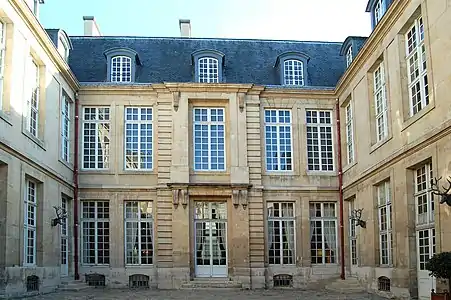
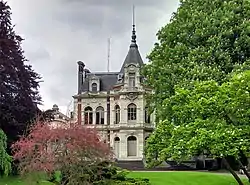 Hôtel Prouvost in Roubaix, France.
Hôtel Prouvost in Roubaix, France.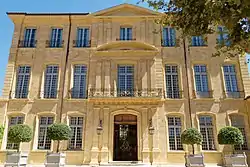
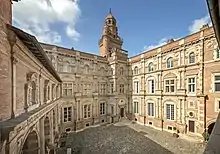
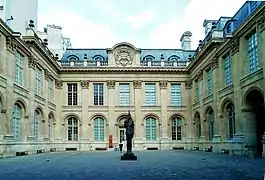 Hôtel de Saint-Aignan in Paris.
Hôtel de Saint-Aignan in Paris.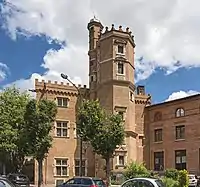 Hôtel Dahus in Toulouse.
Hôtel Dahus in Toulouse.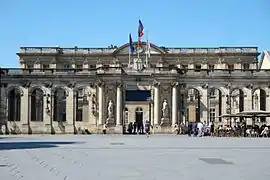 Palais Rohan, in Bordeaux.
Palais Rohan, in Bordeaux.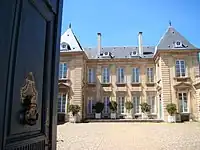 Hôtel de Lalande, in Bordeaux.
Hôtel de Lalande, in Bordeaux.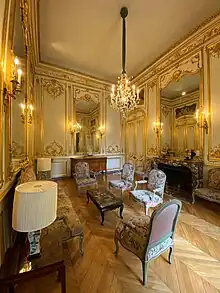 Hôtel de Besenval in Paris.
Hôtel de Besenval in Paris.
References
- Collins Robert French Dictionary
- Michel Gallet, Les architectes parisiens du XVIIIe siècle, Paris;
- Cassell's Latin Dictionary
Further reading
- Monographs have been published on some outstanding Parisian hôtels particuliers.
- The classic photographic survey, now a rare book found only in large art libraries, is the series Les Vieux Hotels de Paris by J. Vacquer, published in the teens and twenties of the 20th century, which takes Paris quarter by quarter and which illustrates many hôtels particuliers that were demolished during the 20th century.
- Blanc, Olivier, Hôtels particuliers de Paris (1998)
- Caylux, Odile et al. Les Hôtels particuliers d'Arles (2000)
- Coquery, Natacha, L’hôtel aristocratique. Le marché du luxe à Paris au XVIIIe siècle, Paris, Publications de la Sorbonne, 1998
- Courtin, Nicolas, L'Art d'habiter à Paris au XVIIe siècle : L'ameublement des hôtels particuliers, Paris, Faton, 2011
- Cros, Philippe,Hôtels particuliers de France (2001)
- Gady, Alexandre, Les Hôtels particuliers de Paris, du Moyen-Âge à la Belle époque, Paris, Parigramme, 2007
- Naudin, Jean-Baptiste et al., Hôtels particuliers de Paris: Visite privée (1999).
- Papillault, Remi Les hôtels particuliers du XVIe siècle à Toulouse (Serie Memoires des pays d'Oc)
- Favreau, Bertrand, Une promenade dans Bordeaux, les hôtels parlementaires, B550B, Mérignac, 2012, ISBN 978-2-95410-753-0.
External links
- Les Vieux Hotels de Paris, Le Faubourg Saint-Germain Kenneth Franzheim II Rare Books Room, William R. Jenkins Architecture and Art Library, University of Houston Digital Library.
- Les Vieux Hotels de Paris, Le Faubourg Saint-Honoré Kenneth Franzheim II Rare Books Room, William R. Jenkins Architecture and Art Library, University of Houston Digital Library.
- Les Vieux Hotels de Paris, Le Ministère de la Marine Kenneth Franzheim II Rare Books Room, William R. Jenkins Architecture and Art Library, University of Houston Digital Library.
- Les Vieux Hotels de Paris, Le Quartier Saint-Paul Kenneth Franzheim II Rare Books Room, William R. Jenkins Architecture and Art Library, University of Houston Digital Library.
- Les Vieux Hotels de Paris, Le Temple et le Marais Kenneth Franzheim II Rare Books Room, William R. Jenkins Architecture and Art Library, University of Houston Digital Library.